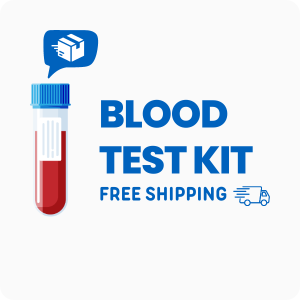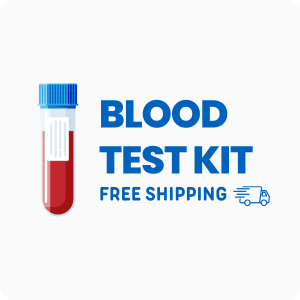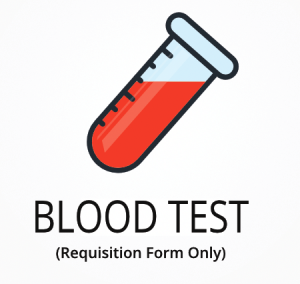Ordering the Complete Thyroid Panel
The thyroid influences metabolism, energy levels, body temperature, and even mood. This comprehensive thyroid panel provides a complete check of thyroid hormones and thyroid antibodies to identify imbalances associated with hypothyroidism, hyperthyroidism, and autoimmune thyroid disorders such as Hashimoto’s, which is rarely tested for.
Watch the thyroid labs explained video to get a full breakdown of each test in the complete thyroid panel.
Interestingly, a thyroid imbalance can affect cholesterol levels. An underactive thyroid can increase LDL cholesterol, while an overactive thyroid can lower cholesterol below normal levels.
Understanding your thyroid hormone balance can help guide treatment decisions. This test offers:
- A complete view of thyroid hormone levels, including free, bound forms like free t3 and free t4
- Assessment of thyroid antibody levels for autoimmune conditions like Hashimoto’s thyroiditis
- Evaluation of thyroid hormone conversion efficiency, including reverse T3
- Insight into potential thyroid-related metabolic concerns like weight gain
- Identification of imbalances that may contribute to fatigue, weight changes, and cognitive issues
Who Should Consider This Full Thyroid Function Panel
Someone feeling persistently exhausted despite getting enough rest might have an undiagnosed thyroid imbalance. A person struggling with unexpected weight fluctuations, sensitivity to cold or heat, brain fog, or mood swings may find that thyroid hormones play a role in these symptoms.
Other situations that may indicate a need for this lab test include:
- Experiencing unexplained weight gain or difficulty losing weight
- Feeling fatigued or sluggish despite adequate sleep
- Noticing hair thinning, dry skin, or brittle nails
- Managing an autoimmune hypothyroid disorder like Hashimoto’s (see the Graves’ Disease test panel for hyperthyroid).
- Having difficulty regulating body temperature, frequently feeling too hot or too cold
Checking thyroid hormone levels can help identify imbalances that may be affecting energy, weight, and mood.
How to Prepare for the Thyroid Hormone and Antibody Panel
Fasting is not required for this test, but biotin supplements should be avoided for at least 48 hours beforehand, as they can interfere with results. Certain medications, such as thyroid hormone replacements, may also influence hormone levels, so following any provided instructions by your doctor is important.
Labs Included When Ordering Your Complete Thyroid Panel
| Test Name | Reference Range | Significance | Low and High Levels |
|---|---|---|---|
| TSH | 0.40 – 4.50 | TSH regulates thyroid hormone production and signals whether the thyroid is functioning properly. | High levels mean the thyroid may be underactive (hypothyroidism).
Low levels mean the thyroid may be overactive (hyperthyroidism). |
| Total T4 | 4.5 – 12.0 | Measures both free and bound thyroxine (T4) to assess thyroid hormone production. | High levels mean excess thyroid hormone production, possibly indicating hyperthyroidism.
Low levels mean reduced thyroid hormone output, which may suggest hypothyroidism. |
| Total T3 | 80 – 200 | Total T3 evaluates the amount of active thyroid hormone available for metabolic processes. | High levels mean excessive active thyroid hormone, which may indicate hyperthyroidism.
Low levels mean inadequate conversion of T4 to T3, possibly affecting energy levels. |
| Free T4 | 0.8 – 1.8 | Free T4 measures the unbound form of thyroxine that is available for use by the body. | High levels mean the thyroid is producing more free hormone than needed.
Low levels mean a possible underactive thyroid or issues with hormone binding. |
| Free T3 | 2.3 – 4.2 | Free T3 is the active form of thyroid hormone that directly affects metabolism. | High levels mean excessive thyroid activity, possibly indicating hyperthyroidism.
Low levels mean poor conversion of T4 to T3, which can contribute to fatigue. |
| Reverse T3 (rT3) | 8 – 25 | Reverse T3 is an inactive form of T3 that increases under stress or illness. | High levels mean the body may be converting too much T4 into inactive T3.
Low levels mean reduced inactive T3 production, which is usually not concerning. |
| T3 Uptake (T3U) | 22 – 35 | T3 Uptake measures thyroid-binding proteins to evaluate hormone transport. | High levels mean fewer binding proteins, which can occur in hyperthyroidism.
Low levels mean increased binding proteins, often seen in hypothyroidism. |
| Free T4 Index | 1.0 – 4.5 | This index estimates free T4 levels by factoring in T3 uptake. | High levels mean increased thyroid activity, similar to hyperthyroidism.
Low levels mean reduced thyroid function, often seen in hypothyroidism. |
| TPO and Anti-TG Antibodies (Hashimoto’s Screen) | Negative | These antibodies help diagnose autoimmune thyroid conditions such as Hashimoto’s thyroiditis. | High levels mean an increased likelihood of an autoimmune thyroid disorder like Hashimoto’s.
Low levels mean little to no detectable thyroid autoimmunity. |
Reference ranges can vary. For the most accurate and up-to-date reference ranges for this lab test, visit Quest Diagnostics.
Complete Thyroid Panel FAQ
Is there Complete Thyroid Panel testing near me?
Use our patient service center locator to find the nearest location for your blood draw. Mobile phlebotomy services are also available in some areas.
What is the cost of the test?
The pricing for the Complete Thyroid Panel is displayed at the top of the page. The cost includes fees for having the sample drawn at a collection site.
How often should I retest?
Monitoring thyroid function every 6-12 months is common when managing known thyroid conditions or adjusting medications. Individuals experiencing new symptoms or those with autoimmune concerns may benefit from more frequent thyroid antibody testing based on personal health needs.
How accurate is the test?
Laboratory testing for thyroid hormones and antibodies is performed using immunoassay and chemiluminescence methods, ensuring precise hormone measurement. These techniques detect even small hormone fluctuations that can impact function. TrueHealthLabs.com only partners with CLIA-certified labs to maintain high testing standards.
Medical Review Board
Reviewed by Jeff Donohue M.D. from Body Logic and Brady Hurst DC, CCCN. Written by True Health Lab’s team of editorial health contributors.
Disclaimer: This information is for educational purposes only and not intended as medical advice. Consult your healthcare provider for personalized guidance.
Why Customers Trust True Health Labs – What People are saying
Also rated 4.6 out of 5 based on 3452 ShopperApproved reviews- See all TrueHealthLabs.com reviews.









